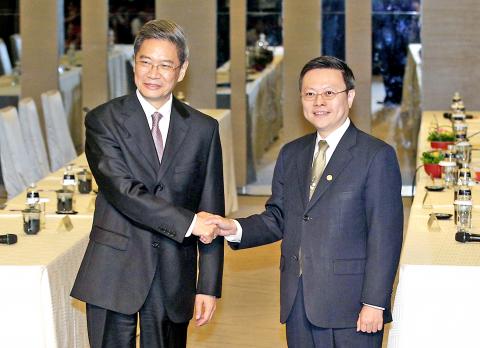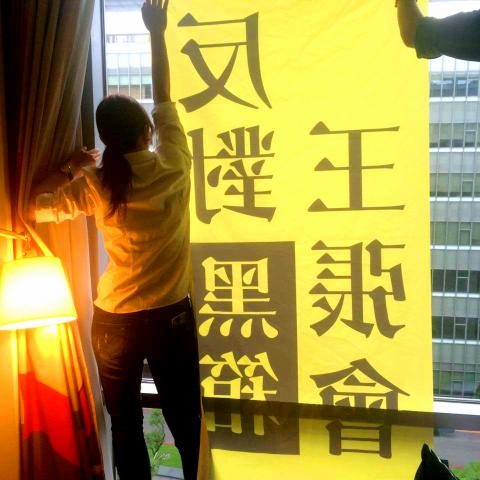China’s top Taiwan policymaker yesterday said it was important that Beijing and Taipei address issues to “consolidate the political foundation” for the continued peaceful development of relations across the Taiwan Strait.
“The cross-strait relationship has entered a new era over the years based on the [so-called] ‘1992 consensus’... Despite recent twists and turns, both sides should be committed to developing and further consolidating the political foundation” to continue to promote cross-strait exchanges in various fields, China’s Taiwan Affairs Office (TAO) Minister Zhang Zhijun (張志軍) was quoted as saying on the first day of his visit to Taiwan.
TAO spokesperson Ma Xiao-guang (馬曉光) conveyed the remarks at a press conference following Zhang’s two-hour closed-door meeting with Mainland Affairs Council (MAC) Minister Wang Yu-chi (王郁琦).

Photo: Pichi Chuang, Reuters
In Zhang’s opening remarks to the press, he said that China and Taiwan have to “increase mutual political trust” so that they can proceed in the right path to promoting the peaceful development of cross-strait relations.
The “1992 consensus” refers to a supposed understanding reached in 1992 between Taiwanese and Chinese representatives, under which both sides acknowledge that there is “one China,” with each side having its own interpretation of what “one China” means.
Zhang’s statements appear to contain a bid for political talks with Taiwan, but at a separate press conference where Wang fielded questions from reporters, the MAC minister denied that Zhang brought up political issues during the meeting.

Screengrab from the Black Island Youth Alliance Facebook page
Zhang’s trip follows a visit by Wang to China in February. That was part of efforts on both sides to establish a system of regular visits by officials and normalize communication channels between the TAO and the MAC.
The reciprocal visit by Zhang was an “important step” toward building government-to-government contact to deal with cross-strait issues, Wang and Zhang said, adding that the two sides would continue to arrange similar visits.
In Wang’s opening remarks, he said he hoped Zhang could experience Taiwan’s energetic and diverse society during his stay. He also urged Zhang and his delegation to “listen to Taiwanese people, understand their lifestyle and respect their decisions.”
At the post-meeting press conference, Wang said he reiterated during the meeting the government’s position that “the future of Taiwan has to be decided by its 23 million people per the Constitution of the Republic of China.”
Wang said he told Zhang that the government’s position is a “consensus” of Taiwanese society and hoped that Beijing would respect it.
Wang was responding to a recent comment made by TAO spokesperson Fan Liqing (范麗青), who said that the future of Taiwan should be decided by all Chinese, including people in Taiwan.
Fan’s remarks sparked a furious response from many Taiwanese. Asked whether Zhang has noticed these reactions, Ma said China’s position on issues related to its territorial integrity is clear, consistent and firm.
Wang added that Zhang agreed to two demands that Taiwan has long made: After Taiwan and China establish reciprocal representative offices across the Strait, the offices should be endowed with the right to visit prisoners detained or jailed on the other side and China should allow its tourists to transit through Taiwan en route to other countries.
On economic issues, Zhang agreed that both sides should start negotiations on the cross-strait service trade agreement in accordance with its emergency negotiation mechanism once the trade pact is passed by the legislature, continue negotiations on trade in goods and begin a study on issues related to regional economic integration.
Wang and Zhang said they did not discuss issues related to possible meetings between President Ma Ying-jeou (馬英九) and Chinese President Xi Jinping (習近平).

SECURITY: As China is ‘reshaping’ Hong Kong’s population, Taiwan must raise the eligibility threshold for applications from Hong Kongers, Chiu Chui-cheng said When Hong Kong and Macau citizens apply for residency in Taiwan, it would be under a new category that includes a “national security observation period,” Mainland Affairs Council (MAC) Minister Chiu Chui-cheng (邱垂正) said yesterday. President William Lai (賴清德) on March 13 announced 17 strategies to counter China’s aggression toward Taiwan, including incorporating national security considerations into the review process for residency applications from Hong Kong and Macau citizens. The situation in Hong Kong is constantly changing, Chiu said to media yesterday on the sidelines of the Taipei Technology Run hosted by the Taipei Neihu Technology Park Development Association. With

CARROT AND STICK: While unrelenting in its military threats, China attracted nearly 40,000 Taiwanese to over 400 business events last year Nearly 40,000 Taiwanese last year joined industry events in China, such as conferences and trade fairs, supported by the Chinese government, a study showed yesterday, as Beijing ramps up a charm offensive toward Taipei alongside military pressure. China has long taken a carrot-and-stick approach to Taiwan, threatening it with the prospect of military action while reaching out to those it believes are amenable to Beijing’s point of view. Taiwanese security officials are wary of what they see as Beijing’s influence campaigns to sway public opinion after Taipei and Beijing gradually resumed travel links halted by the COVID-19 pandemic, but the scale of

A US Marine Corps regiment equipped with Naval Strike Missiles (NSM) is set to participate in the upcoming Balikatan 25 exercise in the Luzon Strait, marking the system’s first-ever deployment in the Philippines. US and Philippine officials have separately confirmed that the Navy Marine Expeditionary Ship Interdiction System (NMESIS) — the mobile launch platform for the Naval Strike Missile — would take part in the joint exercise. The missiles are being deployed to “a strategic first island chain chokepoint” in the waters between Taiwan proper and the Philippines, US-based Naval News reported. “The Luzon Strait and Bashi Channel represent a critical access

Pope Francis is be laid to rest on Saturday after lying in state for three days in St Peter’s Basilica, where the faithful are expected to flock to pay their respects to history’s first Latin American pontiff. The cardinals met yesterday in the Vatican’s synod hall to chart the next steps before a conclave begins to choose Francis’ successor, as condolences poured in from around the world. According to current norms, the conclave must begin between May 5 and 10. The cardinals set the funeral for Saturday at 10am in St Peter’s Square, to be celebrated by the dean of the College